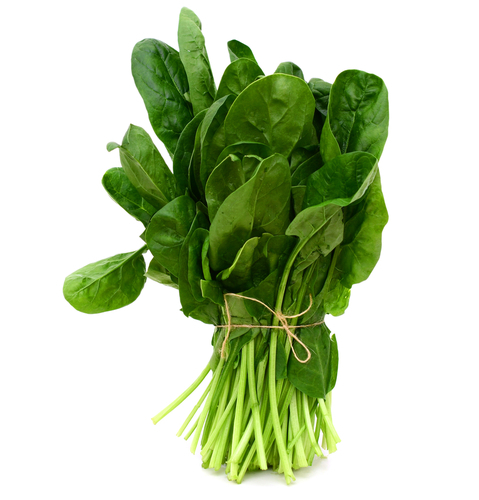Is Spinach Bad For You?
Also Known As: Spinacia oleracea
Short answer
Spinach is definitely not bad for you. It contains a wide variety of vitamins and minerals that are essential for good health.
Very healthy and numerous health benefits. Harmful qualities may be associated, but aren't usually serious.
View Full Grading System
Category 'A'
Very healthy and numerous health benefits. Side effects are rare. Things rated an 'A+' are typically necessary for survival (for example, water).
Very healthy and numerous health benefits. A few harmful qualities may be associated, but only under certain circumstances such as an allergic reaction.
Very healthy and numerous health benefits. Harmful qualities may be associated, but aren't usually serious.
It is important to note that even the best things in life can become bad in immoderate amounts. So, although something may be rated an 'A+', overconsumption/overdoing can bring unwanted effects.
Category 'B'
Very beneficial to your health. Things rated a 'B+' may have a few harmful qualities to pay attention to.
Overall beneficial to your health. Things rated a 'B' may have some harmful qualities to pay attention to.
More beneficial to your health than not. However, harmful qualities are most likely associated and shouldn't be overlooked.
The main difference between category 'A' and category 'B' is the harmful qualities typically present in 'B' items. Serious side effects are usually uncommon, but are still possible and should be taken note of.
Category 'C'
Both beneficial and harmful qualities associated. Things rated a 'C+' are typically a bit more on the beneficial side. Still, moderation is important.
A fairly even ratio of beneficial and harmful qualities. Moderation is important. Very general topics that can lean towards both sides of the spectrum will be placed here as well. Rice, for example, can be good or bad depending on the type.
More harmful than beneficial. Side effects are common, especially when consumed/done excessively. Moderation is very important.
Category 'C' usually denotes to both good and bad qualities. When it comes to this category, it is important to keep this word in mind: moderation.
Category 'D'
Harmful to your health. Although benefits may be associated, the bad most likely outweighs the good. Moderation is very important.
Harmful to your health. A few benefits may be associated, but the bad outweighs the good. Moderation is extremely important.
Harmful to your health. Very few, if any, benefits are present. Things in this category should be avoided as much as possible.
Category 'D' is typically for things that are more harmful than beneficial. While consuming/doing something unhealthy once in a blue moon shouldn't hurt, we definitely recommend eliminating 'D' items as a regular part of your routine/diet.
Category 'F'
Category 'F' is for things that fail to bring anything beneficial to the table, and are very harmful to your health. We recommend completely avoiding anything in this category. Long-term side effects of 'F' items are usually very serious.
Category 'N'
'N' stands for neutral. Things placed into this category are generally (a) neither good nor bad for you, or (b) lack the necessary evidence to reach any conclusions.
Long answer
There's a reason Popeye ate spinach to give him strength, and why your mother fought with you to eat it too-- spinach is a wonder vegetable chock full of vitamins and minerals that are essential for good health. While it may not give you instant super-strength to fight off your nemeses, it does strengthen your immune system to fight other bad guys; namely infections, colds, the flu, and other viral illnesses. The high iron content of spinach ensures your immune system is functioning optimally. Iron also helps blood carry oxygen throughout the body, thereby keeping your energy levels high and your exhaustion to a minimum. Iron is necessary for everybody but is especially important to menstruating women and those suffering with anemia.
Additionally, spinach contains high amounts of vitamin K, vitamin A, folate, and manganese. Vitamin K and manganese are both necessary for building bones and maintaining a healthy skeleton. Keeping these levels up can help prevent osteoporosis, tooth decay, fractures, and breaks. Your eyes rely on vitamin A, which can slow the progression of eye diseases and even lessen the recovery time needed after eye surgeries. Folate is necessary for proper fetal development, and can help reduce the risk of neural tube defects in babies. Spinach also contains the antioxidant beta-carotene, which studies have shown reduce the risk of breast, prostate, and ovarian cancers.
However, spinach also contains oxalic acid, which can interfere with the absorption of iron and calcium if ingested in large quantities. People with a history of oxalate-containing kidney stones may experience a recurrence from high levels of oxalic acid. These individuals should, therefore, limit their spinach consumption or avoid eating it altogether. Recently there have been reports involving foodborne illnesses occurring in spinach. Because animal manure is commonly used as fertilizer, it is possible for spinach and other crops to carry E. coli bacteria occasionally. Not only is this problem very infrequent, but boiling your spinach for as little as fifteen seconds is enough to kill any strands of E. coli that may be present. By choosing organic spinach you eliminate the risk of E. coli completely. Essentially, spinach is an incredibly nutritious vegetable, and as long as you don't have kidney stones there is no excuse for you not to eat your spinach!
Possible long-term side effects
- may contribute to a recurrence of kidney stones.
Ingredients to be aware of
Benefits
- prevents certain cancers
-
prevents anemia
-
slows the development of osteoporosis, tooth decay, and eye diseases
-
strengthens the immune system
Healthier alternatives
- usda certified organic spinach
Please turn your Ad Blocker off to see this content. Thank you!
Thank you for your feedback!
Written by Lindsay
Published on: 01-21-2016
Last updated: 12-10-2016
Thank you for your feedback!
Written by Lindsay
Published on: 01-21-2016
Last updated: 12-10-2016

 Approved by
Approved by 















